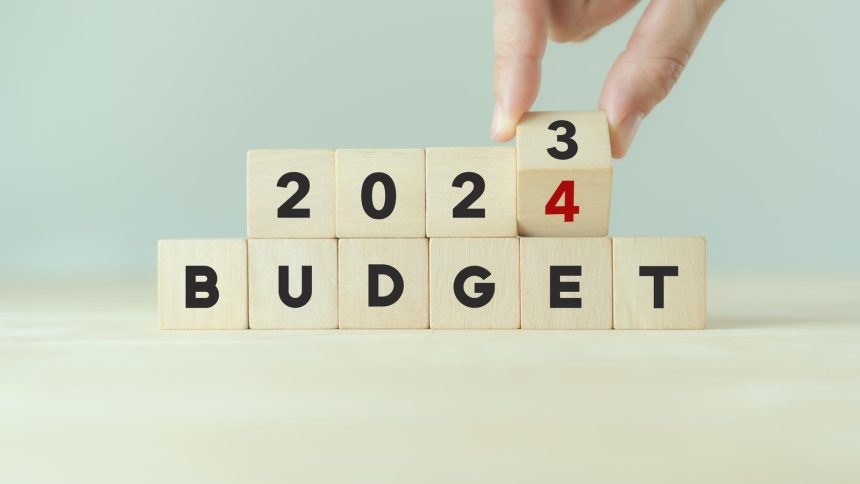Most Americans (72%) do not feel financially secure while only 28% say they’re completely financially secure, according to a recent Bankrate survey.
With interest rates and inflation likely to stay higher in 2024 than previous years, keeping a budget can help offset some of the squeeze you feel on your daily expenses.
But what if you tried to create a budget before and haven’t been able to stick to it? Here are five tips to help you build one you can actually live with in the coming new year.
Schedule Your 2024 Monthly Budget Dates Right Now
You can kick off 2024 with momentum by pulling out your calendar right now. Set up a recurring meeting with your partner, your family, your roommate — whomever it might be — and make it non-negotiable, undisturbed time.
Start each meeting by doing just one task to improve your finances for the month. Some examples:
- Call that dreaded customer service line for the bill you’ve been meaning to get fixed.
- Pay off all your credit card bills in full.
- Move money from a checking to a high-yield savings account.
- Close an account you no longer need.
My husband and I only take an hour to plan our monthly budget. We’ve kept that meeting at 5 p.m. on the first Sunday of every month since 2016, and this is the one habit I singularly credit for helping us pay off $300,000 of debt.
If you want to stick to a budget every month, a regular schedule is key. Set the meeting for the same day and same time every month for one hour. Use this time to remove the clutter you’ve been meaning to clean up in your money.
Stop Wasting Time Trying To Predict The Future
Roughly 3 in 4 Americans reported feeling anxious about their financial situation, according to a 2020 Mind over Money survey by The Decision Lab and Capital One.
From my experience as a financial coach, I learned that many people spend a lot of time trying to predict the future by reading countless articles, researching what might happen and getting caught up in the financial news cycle.
The problem is that predicting the future is futile, as the Covid-19 pandemic recently demonstrated to the world.
Instead focus on preparing for what you can control in the foreseeable future, which is generally no more than 30 days out at a time. Budget one month at a time and focus on one area at a time where you can improve your spending plan.
Rather than listing out all the buckets where you must spend money, find an area that you feel you can control and be intentional about that spending over the next month.
For example, last month I focused on planning my travel wisely. This month is I’m working on my food spending habits. Next month I’m focused on budgeting for the holidays.
Every month can — and should — be different. Don’t plan for next month, until you feel confident that the current one has been handled well.
Accept That 80% Is Good Enough
Self-proclaimed high achievers have a hard time accepting this advice: 80% success is good enough. I have consistently completed a monthly budget since July 2016 and never once did it go 100% according to plan.
During some of those months, almost none of it went according to plan. Yet you can still figure out your goals — and maybe even invest enough to retire early and quit that corporate day job like I did.
Thinking your budget will be exactly right is an unreasonable expectation. Learners in my financial education program often respond by audibly letting out a sigh of relief. Budgeting is not an all-or-nothing activity. It’s better to do it okay with consistency than to do it well without a regular commitment.
Limit Yourself To 5 Minutes Of Self-Loathing
The biggest myth about budgeting is the practice of rehashing what’s already been done: reviewing your past transactions and spending more time beating yourself up than planning for what’s ahead.
Rather than dissecting individual transactions, look for overall trends in behavior that you can try to shift this month. For example:
- If you spent more than you planned on clothing last month, commit to using what you already about this month.
- If you didn’t invest as much as you hoped for last month, put away that goal amount in your budgeting session immediately.
- If you ate out at restaurants that in hindsight weren’t worth it, make weekly meal prep part of your budgeting routine.
It’s helpful to know where there might have been unplanned expenses, but limit your review of last month’s spending to five minutes tops in your one-hour budgeting session for the upcoming month.
Practice For 3 Months Before You Grade Yourself
Budgeting is a skill, and a hard one to master at that. Even if you’ve done it in the past and are getting back into the habit, it’s unreasonable to expect you’ll be great at it from the get-go.
The end of the year is my favorite time to practice a new skill like budgeting because the cold winter months seem to offer fewer distractions of going outside and spending money socializing.
Take December, January and February as your practice months to try a new budgeting routine before you change course. Like the gym or other goals, many people commit to New Year’s resolutions only to give up by Valentine’s Day.
If you start now and give yourself some practice and time to succeed, come spring of next year, you’ll know what worked well and what needs improvement. Plus, you’ll still have a solid 10 months in 2024 to crush your money goals.
Read the full article here


